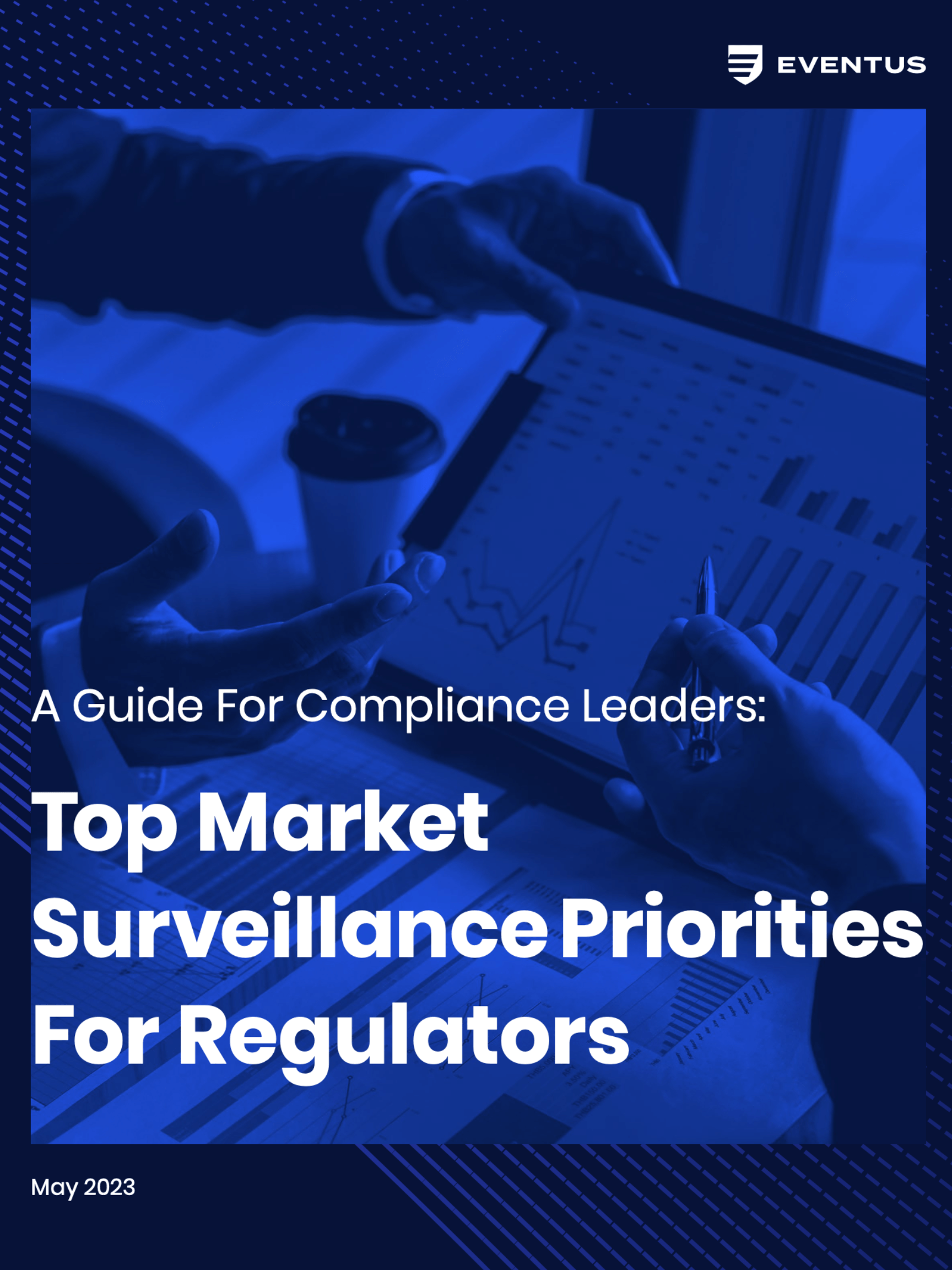Managing surveillance risk is your job.
Find the risk. Manage it swiftly and decisively. Stay ahead of the regulators.
Validus Trade Surveillance for a Global View
Compliance teams at broker-dealers and other intermediaries face high regulatory standards, siloed data, and technical debt. They need well-tuned software with flexible alert parameters and clear documentation for their risk based approach to trading.
Validus is the leading rapid-response trade monitoring solution that allows compliance teams to execute a surveillance strategy, detect potential threats, and navigate market activity.
- A unified platform for trade surveillance, market risk, and algo and transaction monitoring with solutions for broker-dealers, FCMs, and DCMs
- Operate in both T+1 & real-time
- Coverage across all financial asset classes
- Hundreds of ready-to-use integrations and customizable procedures for specific markets and clients.
Sign up for a free demo.
Award-Winning Trade Surveillance
Get a free demo of our Validus platform
Awards and Accolades
Cutting-Edge Technology and Exceptional Service
/RegTech%20100%20Award%202022@2x.png)
/RiskTech2022-TSP@2x.png)
/2022_MCA_Eventus@2x.png)
A Solution Built For Financial Intermediaries
Evolve Your Compliance Program As Surveillance Complexity Increases
Full-Coverage
Operate across markets with diverse regulatory needs. Validus is a multi-asset class platform with a global view and bespoke solutions powered by scalable engineering.
End-to-End Expertise
Our team of former CCOs and heads of surveillance resolve challenging problems with our clients, leveraging real-world experience.
Rapid-Response
Predictable and reliable delivery from our collaborative service model. Validus allows compliance teams to better allocate resources and reduce total cost of ownership (TCO).
Premier Trade Surveillance Software
Keep up with increasing market volatility and an ever-changing regulatory landscape with a trade monitoring solution tailored to your firm's specific needs.
Validus Platform Features
Extremely Powerful, Easy to Deploy
Save time and resources while mitigating the risk of fines and reputational damage.
Real-Time Environment
Prioritization of Important Actionable Alerts
Alerting to Remediation
Targeted Compliance
Account Data Integration
Data Reconciliation
100+ Market Centres

Our Clients
Trusted by the world’s most sophisticated firms
/Straits-Financial-Singapore@2x.png?width=400&height=160&name=Straits-Financial-Singapore@2x.png)
/FirstNewYork-Logo@2x.png?width=400&height=160&name=FirstNewYork-Logo@2x.png)
/Tradovate-Logo@2x.png?width=400&height=160&name=Tradovate-Logo@2x.png)
/Gemini-Logo@2x.png?width=400&height=160&name=Gemini-Logo@2x.png)
/GH-Financials-Logo@2x.png?width=400&height=160&name=GH-Financials-Logo@2x.png)
/TheSmallExchange-Logo@2x.png?width=400&height=160&name=TheSmallExchange-Logo@2x.png)
/Straits-Financial-Logo@2x.png?width=400&height=160&name=Straits-Financial-Logo@2x.png)
/BitMEX-Logo@2x.png?width=400&height=160&name=BitMEX-Logo@2x.png)
/RJO-Logo@2x.png?width=400&height=160&name=RJO-Logo@2x.png)
/EngieLogo@2x.png?width=400&height=160&name=EngieLogo@2x.png)
/MorrisonSecurities-Logo@2x.png?width=400&height=160&name=MorrisonSecurities-Logo@2x.png)
/CoinbaseLogo@2x.png?width=400&height=160&name=CoinbaseLogo@2x.png)
/ClearStreet-Logo@2x.png?width=400&height=160&name=ClearStreet-Logo@2x.png)
/Hertshten-Group-Logo@2x.png?width=400&height=160&name=Hertshten-Group-Logo@2x.png)
/LedgerEdge-Logo@2x.png?width=400&height=160&name=LedgerEdge-Logo@2x.png)
/PhillipCapital-Logo@2x.png?width=400&height=160&name=PhillipCapital-Logo@2x.png)
/Tiger-Brokers-Logo@2x.png?width=400&height=160&name=Tiger-Brokers-Logo@2x.png)
/AbaxxExchangeLogo@2x.png?width=400&height=160&name=AbaxxExchangeLogo@2x.png)


Key Benefits
Comprehensive
Extensive Flexibility
Explainability
Transparency

Client Testimonial
- Karl Jones, Chief Compliance Officer, SpiderRock
A Guide for Compliance Leaders
Market Surveillance Priorities of Global Regulators
What you need to know about trade surveillance regulations
Download our latest report for recommendations on how to keep your firm ahead of the curve and ready for future regulatory changes.
Key insights include:
- An overview of top priorities for SEC, FINRA, the CFTC, UK’s Financial Conduct Authority (FCA), European Securities and Markets Authority (ESMA), Canada’s New SRO, Australian Securities & Investments Commission, Monetary Authority of Singapore (MAS), and the Hong Kong Securities and Futures Commission (SFC).
- An examination of how regulatory attention impacts broker-dealer compliance.
- 5 key takeaways for regulatory and compliance leaders to combat market abuse, protect their company and employees, and reduce the risk of penalties and fines.

Relevant News
VALIDUS IN PRACTICE (VIP)
SEC and CFTC Request Double-Digit Budget Increases in Part to Expand Trade Surveillance Capabilities
April 17, 2023
INDUSTRY INSIGHTS
Equities Trading Rule-Change Proposals: Implications for Data and Surveillance
Feb. 7, 2023
VALIDUS IN PRACTICE (VIP)
Running a Trade Surveillance System Without Proper Calibration and Procedures Is Like Having a Race Car With No Brakes
Nov 15, 2022
FAQs
Why is trade surveillance important?
The Securities and Exchange Commission (SEC), FINRA, CFTC, NFA, and national exchanges have rules about the prohibition of fraud and manipulation, order and trade handling, market access controls, broker-dealer licensing requirements, supervisory control systems, Manning, and limit order display.
For any of these areas, inadequate or poorly calibrated trade surveillance systems can lead to regulatory inquiries and fines. Regulators also will issue enforcement actions for insufficient review of surveillance output, poor training, and a lack of documentation.
Trade surveillance also helps broker-dealers detect and deter market abuse that could lead to expensive civil and criminal liability. The SEC alone is issuing record fines and using a whistleblower program. Under U.S. law, some manipulative trading, like spoofing, can be a criminal offense with prison time.
What types of manipulative trading does Validus monitor?
Validus Trade Surveillance has a full suite of alerts and procedures for broker-dealers. This includes financial and controls for orders and quoting, regulatory controls for intermarket sweep orders (ISOs), market manipulation, Regulation SHO order marking and shortability, and supervisory reports.
Please contact us to learn more.
Here are a few of the market manipulation types that have a Validus alert:
Spoofing is a form of market manipulation in which a trader submits a bid or offer in a security or commodity on an exchange or other trading platform with the intent to cancel the bid or offer before it can be executed.
Layering is like spoofing but with multiple submitted bids or offers at different levels of the order book on an exchange or other trading platform with the intent to cancel the bids or offers before they can be executed.
Both spoofing and layering give a misleading view of supply or demand to artificially move the price to benefit the opposite side execution.
Flashing is the practice of submitting and quickly canceling an order, typically of large size, intended to send a misleading signal to the market.
Front running is when proprietary trading accounts or employee accounts send orders in the moments before customer orders in the same instruments.
Insider trading is when a person trades based on material non-public information to reap a profit or avoid a loss.
Momentum ignition is a series of orders that contributed to a spike in the short-term price of security. Ultimately, the trader seeks profits from this artificial increase in price and will exit out of the larger position at a better price.
Wash trading is when a firm, account, or client appears to be on the same side of a trade with no change of beneficial ownership. Similarly, a wash cross trade is when two or more accounts appear to be on either side of multiple trades resulting in no change of beneficial ownership.
How does Validus handle changing regulatory requirements?
Eventus conducts ongoing research about global financial regulations and engages directly with regulators and market participants. We then feed that research into Validus and work directly with our clients to ensure our software is tailored to their changing needs.
In the U.S., some specific regulatory requirements include:
- Section 10(b) of the Securities Exchange Act of 1934 and associated Rule 10b-5 that cover the prohibition of fraud and manipulation.
- Regulation NMS governs order and trade handling requirements for fair and orderly markets and with “best execution” rules. Rule 611 offers an exemption for inter-market sweep orders (ISOs) under certain circumstances.
- Regulation SHO/order marking and locates are rules governing short sales.
- Rule 15c3-5 covers market access controls.
- Reg ATS are the rules for alternative trading systems.
- FINRA Rule 3110 are the general supervision rules.
- FINRA Rule 3120 covers supervisory control systems and annual testing
Maximize the efficiency of your regulatory operations
Get A Free Demo
